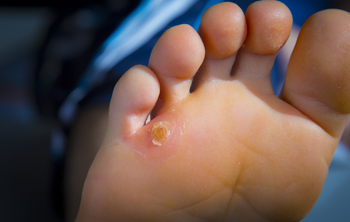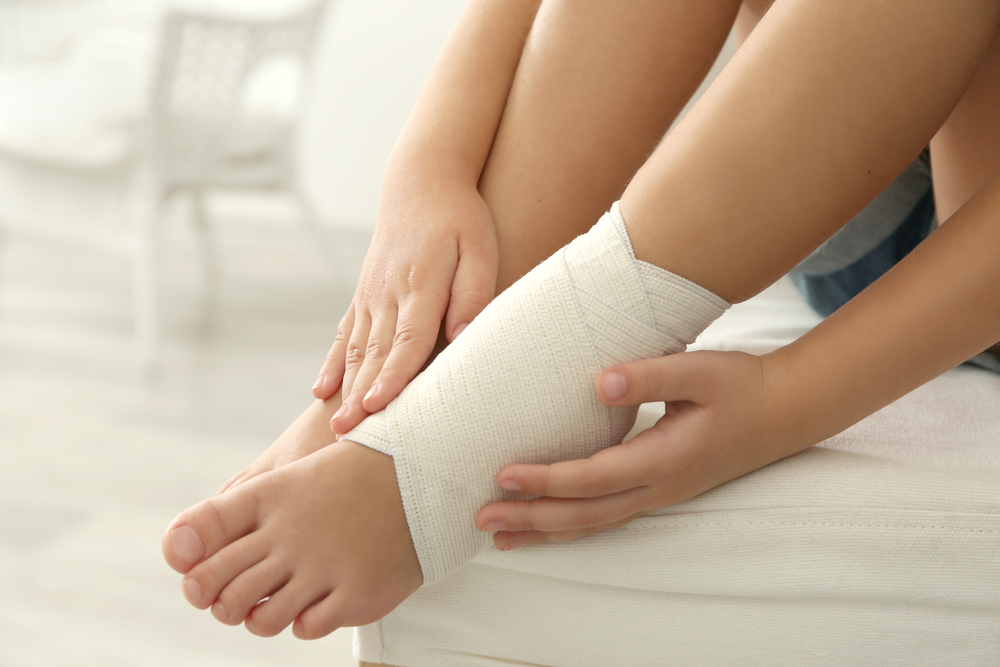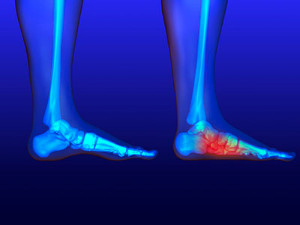Connect With Us
Blog
There Are Two Types of Corns
 A small area of thickened skin on the bottom of the foot may indicate a hard corn. It generally develops as a result of excess friction that can come from wearing shoes and socks that do not fit correctly. A corn can form between the toes, and this is referred to as a soft corn. It can be quite painful, and it may feel better to wear a corn pad over the affected area. This can help the corn to gradually reduce in size, and mild relief may be felt when larger size shoes are worn, as they can diminish excess friction. For corns that are severe, salicylic acid may be applied to the affected area, and the corn will eventually be removed. Corns can be quite bothersome, and if you are afflicted with hard or soft corns, it is recommended that you consult with a podiatrist.
A small area of thickened skin on the bottom of the foot may indicate a hard corn. It generally develops as a result of excess friction that can come from wearing shoes and socks that do not fit correctly. A corn can form between the toes, and this is referred to as a soft corn. It can be quite painful, and it may feel better to wear a corn pad over the affected area. This can help the corn to gradually reduce in size, and mild relief may be felt when larger size shoes are worn, as they can diminish excess friction. For corns that are severe, salicylic acid may be applied to the affected area, and the corn will eventually be removed. Corns can be quite bothersome, and if you are afflicted with hard or soft corns, it is recommended that you consult with a podiatrist.
If you have any concerns regarding your feet and ankles, contact one of our podiatrists of Foot & Ankle Associates of Maine. Our doctors will treat your foot and ankle needs.
Corns: What Are They? and How Do You Get Rid of Them?
Corns can be described as areas of the skin that have thickened to the point of becoming painful or irritating. They are often layers and layers of the skin that have become dry and rough, and are normally smaller than calluses.
Ways to Prevent Corns
There are many ways to get rid of painful corns such as wearing:
- Well-fitting socks
- Comfortable shoes that are not tight around your foot
- Shoes that offer support
Treating Corns
Treatment of corns involves removing the dead skin that has built up in the specific area of the foot. Consult with Our doctors to determine the best treatment option for your case of corns.
If you have any questions please feel free to contact our office located in Brunswick, ME . We offer the newest diagnostic and treatment technologies for all your foot and ankle needs.
Common Reasons for Ankle Pain
 Your ankle can hurt for a variety of reasons. The most common cause of ankle pain is an injury, such as a strain or a sprain. A strain is an injury to the muscle or tendon of the ankle, while a sprain is an injury to the ligament. Both types of injuries can vary in severity and may cause pain or discomfort, tenderness, and swelling. Other possible injuries of the ankle include Achilles tendon ruptures or ankle fractures, which are more severe in nature. Several types of arthritis can affect the ankle, including osteoarthritis, rheumatoid arthritis, and gout. An infection, in which bacteria enters the skin or the joint around the ankle can cause pain and swelling, in addition to fever and fatigue. Flat feet or fallen arches may lead to ankle pain as well. If you are experiencing ankle pain, it is recommended that you see a podiatrist for a proper diagnosis and to begin the best course of treatment that is right for you.
Your ankle can hurt for a variety of reasons. The most common cause of ankle pain is an injury, such as a strain or a sprain. A strain is an injury to the muscle or tendon of the ankle, while a sprain is an injury to the ligament. Both types of injuries can vary in severity and may cause pain or discomfort, tenderness, and swelling. Other possible injuries of the ankle include Achilles tendon ruptures or ankle fractures, which are more severe in nature. Several types of arthritis can affect the ankle, including osteoarthritis, rheumatoid arthritis, and gout. An infection, in which bacteria enters the skin or the joint around the ankle can cause pain and swelling, in addition to fever and fatigue. Flat feet or fallen arches may lead to ankle pain as well. If you are experiencing ankle pain, it is recommended that you see a podiatrist for a proper diagnosis and to begin the best course of treatment that is right for you.
Ankle pain can be caused by a number of problems and may be potentially serious. If you have ankle pain, consult with one of our podiatrists from Foot & Ankle Associates of Maine. Our doctors will assess your condition and provide you with quality foot and ankle treatment.
Ankle pain is any condition that causes pain in the ankle. Due to the fact that the ankle consists of tendons, muscles, bones, and ligaments, ankle pain can come from a number of different conditions.
Causes
The most common causes of ankle pain include:
- Types of arthritis (rheumatoid, osteoarthritis, and gout)
- Ankle sprains
- Broken ankles
- Achilles tendinitis
- Achilles tendon rupture
- Stress fractures
- Bursitis
- Tarsal tunnel syndrome
- Plantar fasciitis
Symptoms
Symptoms of ankle injury vary based upon the condition. Pain may include general pain and discomfort, swelling, aching, redness, bruising, burning or stabbing sensations, and/or loss of sensation.
Diagnosis
Due to the wide variety of potential causes of ankle pain, podiatrists will utilize a number of different methods to properly diagnose ankle pain. This can include asking for personal and family medical histories and of any recent injuries. Further diagnosis may include sensation tests, a physical examination, and potentially x-rays or other imaging tests.
Treatment
Just as the range of causes varies widely, so do treatments. Some more common treatments are rest, ice packs, keeping pressure off the foot, orthotics and braces, medication for inflammation and pain, and surgery.
If you have any questions, please feel free to contact our office located in Brunswick, ME . We offer the newest diagnostic and treatment technologies for all your foot care needs.
What Causes Flat Feet?
 Flat feet occur when the arch of the foot is lower than normal or nonexistent. Because flat feet change how the feet and legs align, they can cause pain in the heel, arches of the feet, or the legs. One cause of flat feet occurs when the feet do not develop correctly during childhood. Most children develop a visible arch in their feet by around age 10, but in some cases, the arch never develops. While this occurs regularly and is not a big issue, flat feet can also develop with age. Risk factors for developing flat feet include injuries, arthritis, diabetes, or obesity. Signs of flat feet include shoes that don’t wear out evenly, pain in the feet and legs, or weakened feet. If you are suffering from the signs of flat feet, it is important to consult with a podiatrist to discuss proper treatment options. These may include orthotics, special stretches or a weight loss strategy.
Flat feet occur when the arch of the foot is lower than normal or nonexistent. Because flat feet change how the feet and legs align, they can cause pain in the heel, arches of the feet, or the legs. One cause of flat feet occurs when the feet do not develop correctly during childhood. Most children develop a visible arch in their feet by around age 10, but in some cases, the arch never develops. While this occurs regularly and is not a big issue, flat feet can also develop with age. Risk factors for developing flat feet include injuries, arthritis, diabetes, or obesity. Signs of flat feet include shoes that don’t wear out evenly, pain in the feet and legs, or weakened feet. If you are suffering from the signs of flat feet, it is important to consult with a podiatrist to discuss proper treatment options. These may include orthotics, special stretches or a weight loss strategy.
Flatfoot is a condition many people suffer from. If you have flat feet, contact one of our podiatrists from Foot & Ankle Associates of Maine. Our doctors will treat your foot and ankle needs.
What Are Flat Feet?
Flatfoot is a condition in which the arch of the foot is depressed and the sole of the foot is almost completely in contact with the ground. About 20-30% of the population generally has flat feet because their arches never formed during growth.
Conditions & Problems:
Having flat feet makes it difficult to run or walk because of the stress placed on the ankles.
Alignment – The general alignment of your legs can be disrupted, because the ankles move inward which can cause major discomfort.
Knees – If you have complications with your knees, flat feet can be a contributor to arthritis in that area.
Symptoms
- Pain around the heel or arch area
- Trouble standing on the tip toe
- Swelling around the inside of the ankle
- Flat look to one or both feet
- Having your shoes feel uneven when worn
Treatment
If you are experiencing pain and stress on the foot you may weaken the posterior tibial tendon, which runs around the inside of the ankle.
If you have any questions please feel free to contact our office located in Brunswick, ME . We offer the newest diagnostic and treatment technologies for all your foot and ankle needs.
Achilles Tendonitis: An Overview
 If you play a sport or follow sports news, then you have likely heard of Achilles tendon injuries. Achilles tendonitis is extremely common among athletes, although anyone can incur an Achilles tendon injury. This type of injury stems from overuse. When the calf muscles that connect the heel bone to the Achilles tendon are overloaded, the tendon can become swollen, painful, and tender to the touch. The most common symptom is pain at the back of the calf. Treatment involves at-home care, such as rest and taking anti-inflammatory drugs, under the supervision of your doctor. If you have an Achilles tendon injury, it is suggested that you consult with a podiatrist as soon as possible.
If you play a sport or follow sports news, then you have likely heard of Achilles tendon injuries. Achilles tendonitis is extremely common among athletes, although anyone can incur an Achilles tendon injury. This type of injury stems from overuse. When the calf muscles that connect the heel bone to the Achilles tendon are overloaded, the tendon can become swollen, painful, and tender to the touch. The most common symptom is pain at the back of the calf. Treatment involves at-home care, such as rest and taking anti-inflammatory drugs, under the supervision of your doctor. If you have an Achilles tendon injury, it is suggested that you consult with a podiatrist as soon as possible.
Achilles tendon injuries need immediate attention to avoid future complications. If you have any concerns, contact one of our podiatrists of Foot & Ankle Associates of Maine. Our doctors can provide the care you need to keep you pain-free and on your feet.
What Is the Achilles Tendon?
The Achilles tendon is a tendon that connects the lower leg muscles and calf to the heel of the foot. It is the strongest tendon in the human body and is essential for making movement possible. Because this tendon is such an integral part of the body, any injuries to it can create immense difficulties and should immediately be presented to a doctor.
What Are the Symptoms of an Achilles Tendon Injury?
There are various types of injuries that can affect the Achilles tendon. The two most common injuries are Achilles tendinitis and ruptures of the tendon.
Achilles Tendinitis Symptoms
- Inflammation
- Dull to severe pain
- Increased blood flow to the tendon
- Thickening of the tendon
Rupture Symptoms
- Extreme pain and swelling in the foot
- Total immobility
Treatment and Prevention
Achilles tendon injuries are diagnosed by a thorough physical evaluation, which can include an MRI. Treatment involves rest, physical therapy, and in some cases, surgery. However, various preventative measures can be taken to avoid these injuries, such as:
- Thorough stretching of the tendon before and after exercise
- Strengthening exercises like calf raises, squats, leg curls, leg extensions, leg raises, lunges, and leg presses
If you have any questions please feel free to contact our office located in Brunswick, ME . We offer the newest diagnostic tools and technology to treat your foot and ankle needs.
